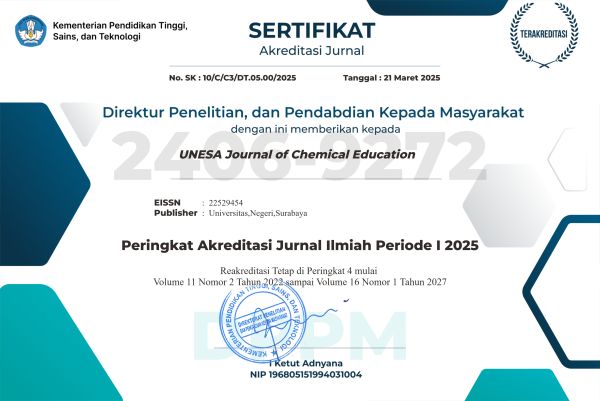THE INFLUENCE OF THE STEAM APPROACH ON THE PjBL MODEL ON STUDENTS' COLLOID LEARNING OUTCOMES
DOI:
https://doi.org/10.26740/ujced.v13n2.p139-147Keywords:
STEAM, Project Based Learning, Learning Outcomes, ColloidAbstract
Chemistry learning at SMA Negeri 7 Takalar is still dominated by teacher-centered learning. Students still have difficulty understanding chemistry lessons such as colloids, the material of which is conceptual in nature and requires contextual application of concepts. Therefore, it is very important to carry out learning that involves students actively applying colloid theory and concepts through the STEAM approach in the Project Based Learning learning model. This research is quasi-experimental research that aims to determine the colloid learning outcomes of students after learning with the STEAM approach in the PjBL Model for Class XI MIPA SMA Negeri 7 Takalar. Posttest only control group design research design. The population is all class XI students consisting of three classes. The results of inferential statistical tests show that student learning outcomes using the t-test at a value of α = 0.05 obtained a value of tcount > ttable (2.83 > 1.99) and the research samples for Class XI MIPA 2 and Class XI MIPA 3 as experimental and control groups were randomly selected. The results of the descriptive analysis show that the completeness of learning outcomes for the experimental class is 72.73% higher than the control class, 48.48%. This means that H0 is rejected and H1 is accepted, thus it can be concluded that the STEAM approach in the Project Based Learning Model has a significant influence on the colloid learning outcomes of class XI MIPA students at SMA Negeri 7 Takalar.
Downloads
References
Sumardiana, S., Hidayat, A., and Parno. 2019. Kemampuan Berpikit Kritis pada Model Project Based Learning disertai STEAM Siswa SMA pada Suhu dan Kalor. Jurnal Pendidikan: Teori, Penelitian, Dan Pengembangan, Vol. 4, No. 7, pp. 874–879.
Warsono. 2016. Pembelajaran Aktif. Bandung: PT. Remaja Rosdakarya.
Mihardi, S., Harahap, M. B., and Sani, R. A. 2013. The Effect Project Based Learning Model with KWL Worksheet on Student Creative Thinking Process in Physics Problems. Journal of Education and Practice, Vol. 4, No. 25, pp. 188–200.
Mufida, S. N., Sigit, D. V., and Ristanto, R. H. 2020. Integrated Project-Based E-Learning with Science, Technology, Engineering, Arts, and Mathematics (PjBeL-STEAM): Its Effect on Science Process Skills. Biosfer, Vol. 13, No. 2, pp. 183–200.
Taylor, P. C. 2016. Why Is a STEAM Curriculum. Diriktur Riset Pendidikan Transformasi Center (TERC). Australia Barat: Diriktur Riset Pendidikan Transformasi Center (TERC): Universitas Murdoch.
Nurwulan, N. R. 2020. Pengenal Metode STEAM kepada Siswa Tingkat Sekolah Dasar Kelas 1 Sampai 3. Madaniya, Vol. 1, No. 3, pp. 140–146.
Perignat, E., and J., K.-B. 2019. STEAM in Practice and Research: An Integrative Literature Review. Thingking Skills and Creativity, Vol. 31, pp. 31–43.
Chang, R. 2004. Kimia Dasar Konsep-Konsep Inti Edisi Ketiga Jilid I. Jakarta: Erlangga.
Sugiarti. 2019. Pengembangan Model Pembelajaran Discovery Learning Berbasis Kontekstual Pada Mata Pelajaran Kimia Sebagai Upaya Menanamkan Sikap Ilmiah Peserta didik SMA. Proceedings of National Seminar: Research and Community Service Institute Universitas Negeri Makassar, pp. 462–465.
Grahito, W. A. 2020. Penyelenggaraan Pembelajaran IPA Berbasis Pendekatan STEM dalam Menyongsong Era Revolusi Industri 4.0. Lensa (Lentera Sains): Jurnal Pendidikan IPA, Vol. 10, No. 1, pp. 54–62.
Parampo, K., S. 2022. Pengaruh Model Project Based Learning dengan Pendekatan Steam Terhadap Hasil Belajar Peserta Didik Kelas XI MIPA SMA Negeri 1 Parepare. (Studi Pada Materi Pokok Koloid). Makassar: Universitas Negeri Makassar.
Supriadi. 2015. Penilaian Autentik Pembelajaran Afektif, Kognitif, dan Psikomotorik (Konsep dan Aplikasi). Jakarta: Rajawali Pers.
Subana, Rahada, M., and Sudrajat. 2000. Statistik Pendidikan. Bandung: CV Pustaka Setia.
Furi, L. M. I., Handayani, S., and Maharani, S. 2018. Eksperimen Model Pembelajaran Project Based Learning dan Project Based Learning Terintegrasi STEM untuk Meningkatkan Hasil Belajar dan Kreativitas Siswa Pada Kompetensi Dasar Teknologi Pengolahan Susu. Jurnal Penelitian Pendidikan, Vol. 35, No. 1, pp. 49–60.
Sanjaya, W. 2012. Perencanaan dan desain sistem pembelajaran: Edisi Pertama. Jakarta: Kencana.
Downloads
Published
Issue
Section
License
The license terms of the Creative Commons Attribution-NonCommercial 4.0 International (CC BY-NC 4.0) requires attribution to the original creator, permits non-commercial use, and does not allow for the application of legal or technological restrictions on others' use.
 Abstract views: 60
,
Abstract views: 60
, PDF Downloads: 64
PDF Downloads: 64













